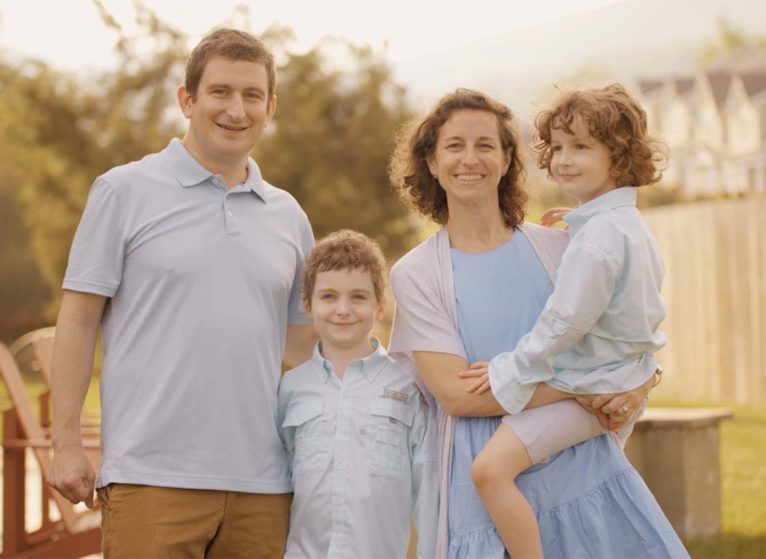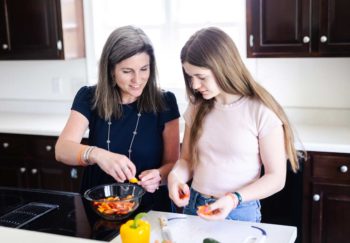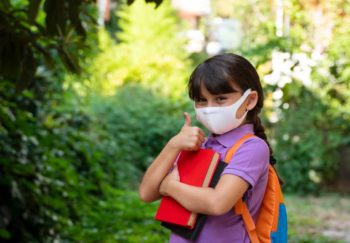“It was devastating,” Allison Lyons, MD, remembers about hearing her 8-year-old son’s leukemia was back. “It wasn't fair. You're just so afraid of him having all those complications again.”
Two years of chemo treatment had been difficult for Colin Seaman, diagnosed with a high-risk leukemia at 5 years old. He suffered gastrointestinal bleeds, pancreatitis, and C. difficile colitis.
COLIN SEAMAN: Hi, my name is Colin. And I'm eight, almost nine. I'm in third grade.
CHRIS SEAMAN: He is passionate. Pokemon or chess or board games, or soccer in the backyard. He's all in. He's really just a neat, curious kid. You know, I think the first symptom we noticed was actually in early fall 2018. He started complaining about having pain. I took him in to UVA Northridge to see his pediatrician. And still couldn't identify what exactly it was. They took a blood test. And then I got a phone call, which had the news that every parent dreads that your child has cancer. And you've got to take him to the emergency room today.
DANIEL "TREY" LEE, MD: Colin was diagnosed with Philadelphia chromosome positive acute lymphoblastic leukemia, which is a very high risk type of leukemia.
ALLISON LYONS, MD: But you feel really lost and bewildered at the very beginning. He was in so much pain. They had to put him on a pain pump. And he couldn't walk at all. He was five at the time. The first two years was not a walk in the park. He ended up with some severe reactions to some of his chemotherapy. So he ended up spending about 120 days in the hospital just due to all of his complications. And so he finally finished treatment in October of 2020.
DANIEL "TREY" LEE, MD: You know, he went into remission with his upfront chemotherapy and treatment. But soon after his leukemia came back. And because it came back so quickly, we knew that it was going to be really aggressive.
ALLISON LYONS, MD: Hearing that he relapsed, you just thought it wasn't fair. And it was just devastating. Because you're just so afraid of him having all those complications again.
DANIEL "TREY" LEE, MD: We were fortunate to have available here at University of Virginia a clinical trial of a CAR T-cell therapy that would attack his leukemia. But we had to make it. And this is done in a really specialized center. It can't be done everywhere. But fortunately, UVA is one of those places where we can do it. We infuse Colin with his superhero T-cells, like I like to call them. And they're all attacking his leukemia.
CHRIS SEAMAN: And it really was miraculous how well it worked. They tested him afterwards. And he was in complete remission, again, with no evidence of leukemia.
DANIEL "TREY" LEE, MD: Compared to his chemotherapy experience that he had had before, that was really incredibly toxic, this was a walk in the park for him. And even better, it got rid of his leukemia. So right now, Colin is doing fantastic.
ALLISON LYONS, MD: Dr. Lee really knows us as a family. He provides amazing care to Colin.
CHRIS SEAMAN: It's amazing to be able to come back home and play soccer in the backyard and play tee ball. And if you just saw Colin, you wouldn't know what he's gone through the past three and a half years. We're so deeply grateful for all the treatment he's gotten that has allowed him to be more like a normal kid again.
But by October 2020, Colin’s cancer went into remission. He completed an entire year of school. But then his cancer came back.
Superhero Cells Fight Cancer
Fortunately, Colin was able to take part in a clinical trial for CAR T-cell therapy at UVA Children’s.
Pediatric oncologist Trey Lee, MD, has cared for Colin over the years. And Lee was instrumental in one of the first clinical trials for CAR T-cell therapy for children with leukemia. Colin was the third child to take part in the trial.
"In order to treat Colin, we had to pull out all the guns for him," recalls Lee.
Before the treatment, Lee explained to Colin how CAR T-cell therapy works.
"First, we collected Colin's T-cells," Lee says "These are part of his blood's white blood cells. They usually fight off infections and other things. And we sent them off to this company. Then they take his T-cells and genetically engineer them with a new protein that can recognize his cancer."
Pediatric Cancer Treatment
At UVA Health Children’s, our team of pediatric cancer specialists is compassionate and knowledgeable. We’ll be here for you and your child every step of the way.
Lee calls these new T-cells “superhero” cells. Once back in Colin’s body, the modified cells expanded and multiplied by the thousands, with the sole purpose of attacking the leukemia until it was gone.
No Sign of Leukemia after CAR T-Cell Therapy
Colin's father, Chris Seaman, recalls how quickly he recovered from CAR T-cell therapy.
“It was really miraculous how well it worked,” he says. “He was in complete remission, again, with no evidence of leukemia. And this was exactly what we were hoping and praying for.”


